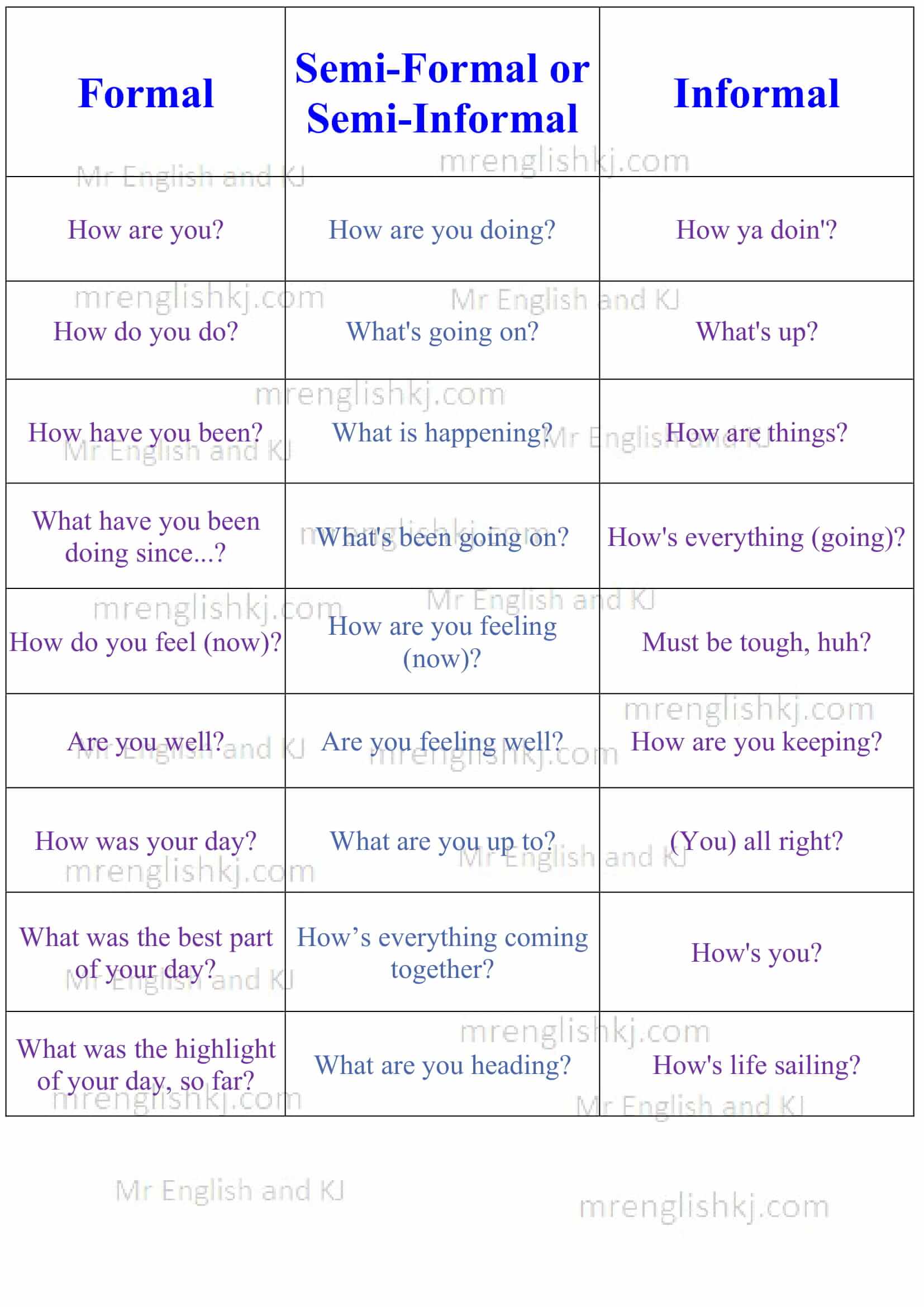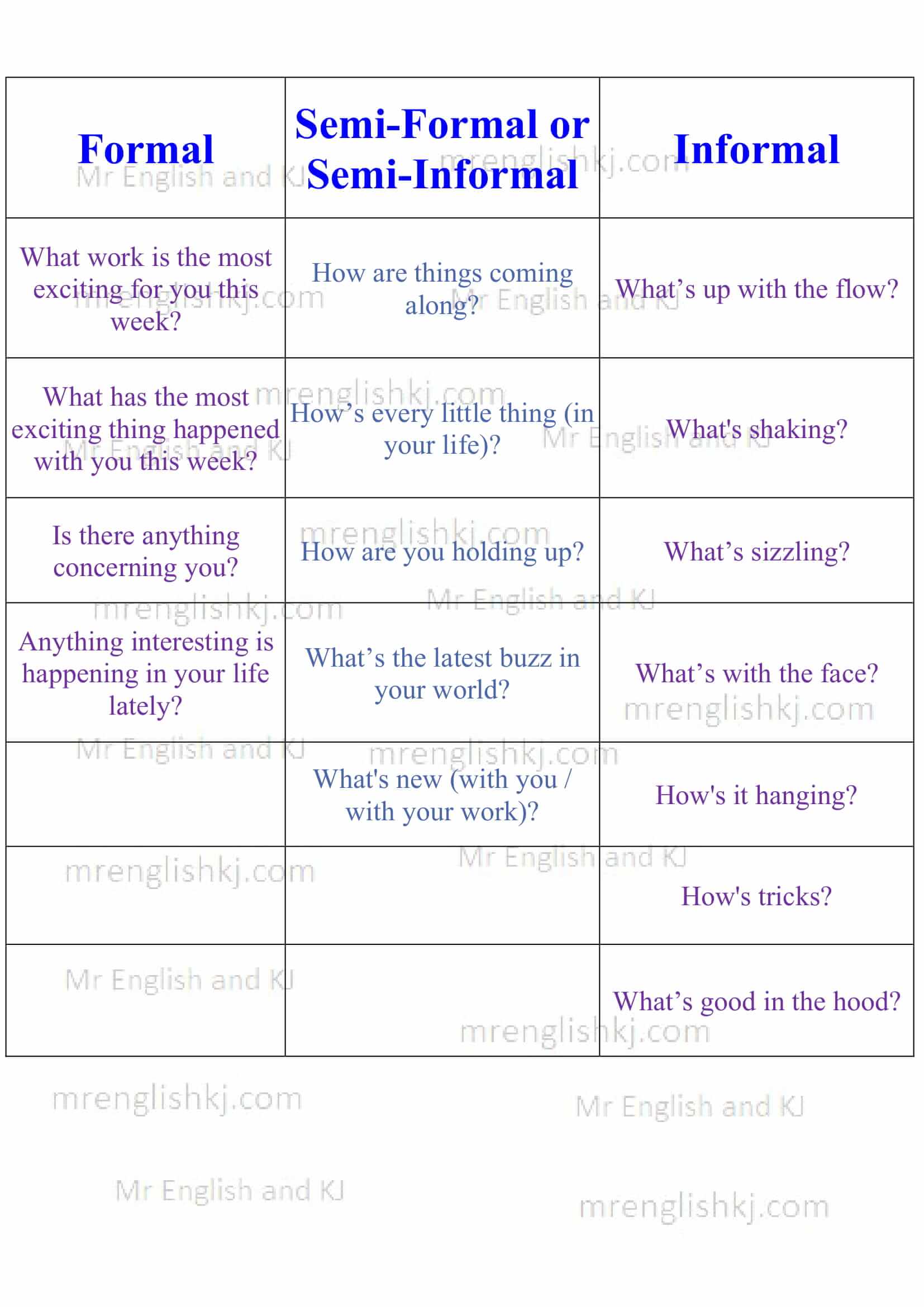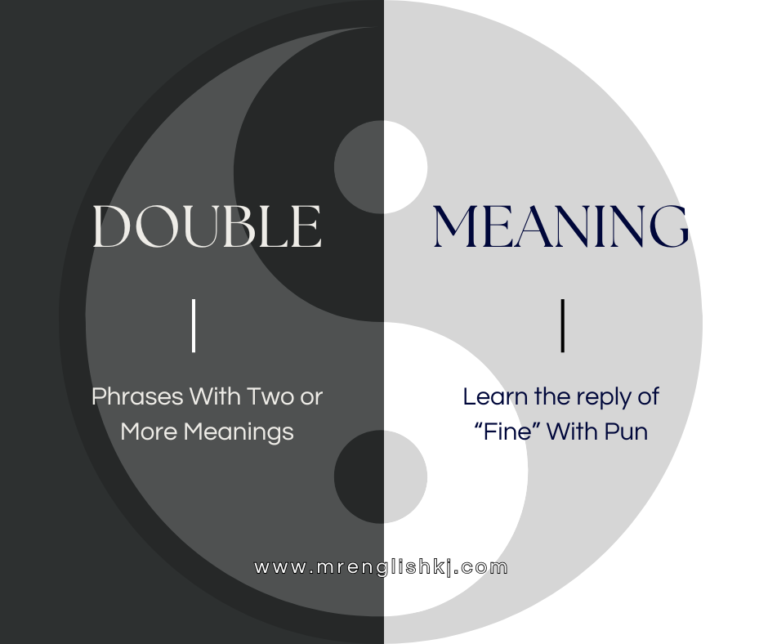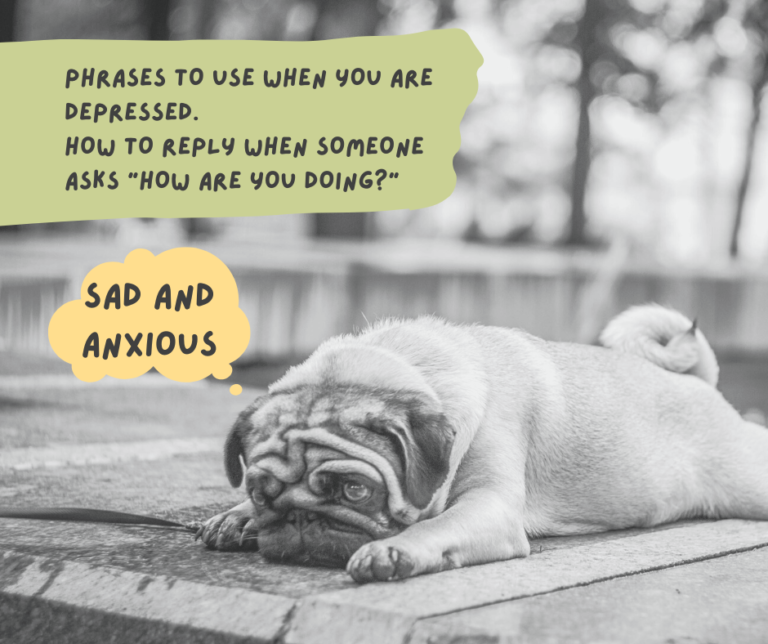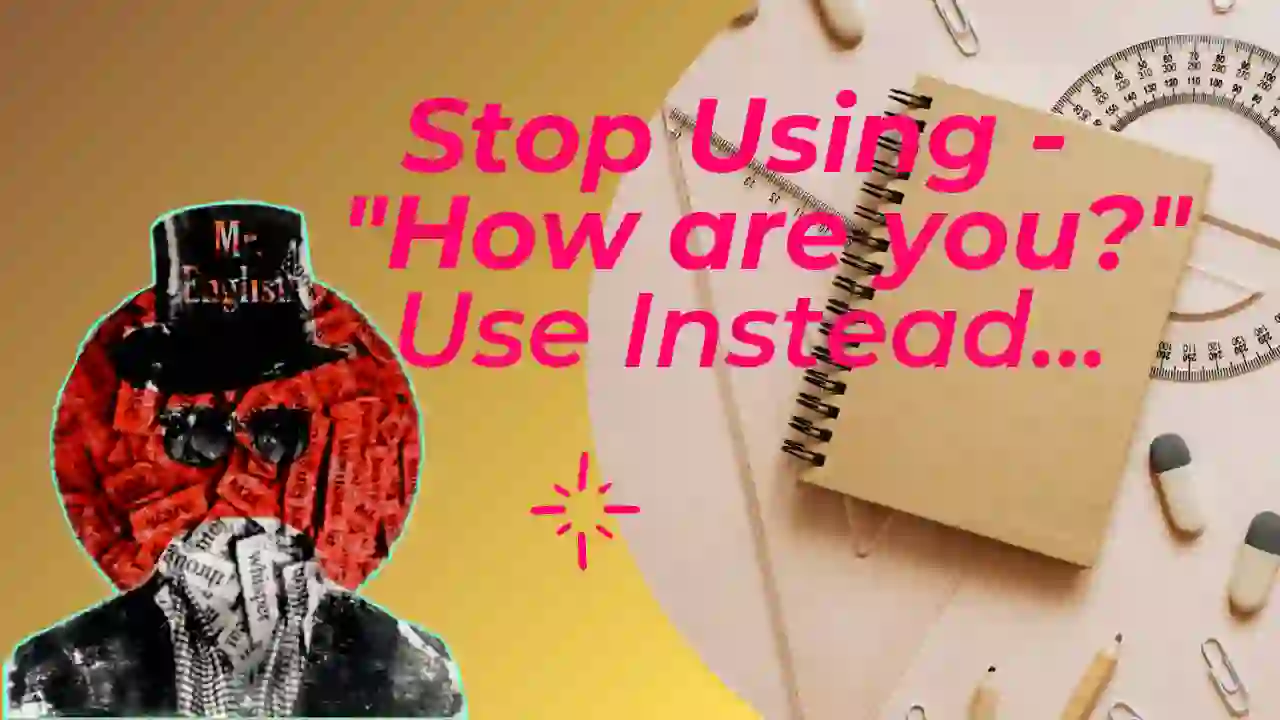
Ways To Say “How are you?”
[su_spacer size=”60″]
Ways to Say ‘How are you?’:- By using one phrase all the time shows that you do not have words to say, you can not express yourself, or your talk is boring. This gives a negative effect on your personality. People do not listen to you if you use a few same words, phrases, or sentences all the time. What can you do to make your personality impressive, charming, and effective? Here we take a small step toward your personality development.
[su_spacer size=”20″]
Stop using ‘How are you? Use instead – How do you do?
What’s up with the flow?
What’s going on?
Etc.
[su_spacer size=”20″]
You need to use other ways to say ‘How are you?’ You should use all these phrases with your emotion. You can also learn the “Ways to Say ‘I am fine.”
By saying it all the time = How are you? How are you? How are you? It sounds boring and repetitive.
Let’s groom your personality!
[su_spacer size=”100″]
[su_youtube url=”https://youtu.be/uy_Lq23ZZ4U” responsive=”no” title=”Ways To Say ‘HOW ARE YOU?'”]
[su_spacer size=”100″]
Ways to Ask “How Are You”
[su_spacer size=”50″]
[su_spacer size=”20″]
[su_button url=”https://mrenglishkj.com/wp-content/uploads/2021/01/Ways-to-say-How-are-you.pdf” target=”blank” style=”3d” background=”#fd374c” color=”#ffffff” size=”10″ center=”yes” radius=”20″ desc=”Ways To Say How are you Pdf File”]Click to Download “How are you?” Pdf File[/su_button]
[su_spacer size=”50″]
[su_spacer size=”60″]
Formal
Formal – We call a sentence formal when there is:-
- a complete sentence (there is no abbreviation)
- a polite sentence
- no idiom, dialogue, phrasal-verb, or slang.
- no grammatical error.
How are you? – A formal term to ask someone’s condition or life. “How are you?” is still very popular but it is not compulsory to answer your actual condition. People usually tell a lie by saying “I am fine.”
How do you do? – The most formal way to ask greetings, we use it in place of “How are you?” but it is more formal. If anyone uses “How do you do?” then you should ask in the same manner to him or her “How do you do?” after giving the answer of his or her asked question.
How have you been and What have you been since we last …? – Asking “What have you been up to? and How life has been for you from a certain point in time?”, we can ask by adding a certain point in time like:
- How have you been doing since the last time (we saw each other)?
- How have you been doing since the last time (we talked)?
- How have you been?
- How have you been since (we blocked each other)?
- Same like we can use – What have you been since (we last …)?
We can use any point in time here. To know more about a point in time –
[su_button url=”https://mrenglishkj.com/present-perfect-continuous/” target=”blank” style=”3d” background=”#ff5111″ size=”10″]To know more about Point in Time. Click the button.[/su_button]
You can not use it for the people. You talk daily or You meet them the first time. After some time, when you meet the person again then you can use it. The person will answer differently, not just “I am fine.” It is a good way to start a better conversation.
How do you feel (now)? – How do you feel? It is more formal than “How are you feeling?” We use Present Indefinite or Simple which represents a physical or metal both condition or feeling. Asking a general mood or feeling of a person, a regular feeling not the feeling which is now. How do you feel now? represents a mood or feeling which is now, not the general or regular feeling. It shows whatever happens in past but “How do you feel now?”
Are you well? – Asking about a physical condition means the medical condition of a person. You can not describe your condition just answer in a yes-no way like I am well, I am not well, and so on.
How was your day? – Asking about the day, it is not about you, it is about your day. A good conversation starter.
- X – How was your day?
- Y – It was pathetic.
- X – Why was it pathetic? Then Y will reply… A good conversation starter.
What was the best part of your day? – Asking about the best part of the day, it is not about you. A good conversation starter. The answer is in a descriptive way, not in just a few words.
What was the highlight of your day, so far? – Asking all the highlighted or important things that happened in your day. The answer is in a descriptive way and mostly in Past Tense.
What work is the most exciting for you this week? – Asking the most exciting work of this week, it is not about you. It is about the work. The answer is in a descriptive way.
Anything interesting is happening in your life lately? – Asking something interesting is happening in your life recently or in a short time.
What has the most exciting thing happened with you this week? – Asking the most exciting thing that happened this week, it is not about you. It is about any situation or anything that happened. The answer is in a descriptive way.
[su_spacer size=”50″]
Semi-Formal or Semi-Informal
Semi-Formal or Semi-Informal – We call a sentence semi-formal or semi-informal when there is –
- an abbreviation in a sentence.
- no polite sentence
- idiom, dialogue, or phrasal-verb.
- no slang.
- sometimes a minor grammatical error.
How are you doing? – It is a combination of “How are you + What are you doing?”
What’s going on? – Asking “What is happening?” or “What are you doing?”
How are you feeling (now)? – How are you feeling? We use Present Continuous which represents mood or feeling but generally, we use it to inquire about the physical condition of a person. It also shows irritation or disturbance in the person that is why we ask “How are you feeling?” It is a progressive tense that shows the progress of the physical condition.
How are you feeling now? We use it for the physical condition that is progressing. We just ask about the current physical progressive condition of a person.
Are you feeling well? – Asking about a physical condition means a medical condition of a person. You can not describe the answer just give a yes-no answer like I am feeling well, I am feeling unwell, and so on.
What are you up to? – It is an idiom that means “What are you doing?”
How is everything coming together? – Coming together means – “It’s going to be successful.” or “It’s getting closer to completion.” We usually use this to talk about any project, task, or deadline which is going to complete sooner.
What are you heading? – Asking “What is your progress?” Heading means progressing in a certain direction. When you are not doing anything, someone asks you this question. It means, “Someone is asking generally.”
How are things coming along? – Asking “How are things going?” or “What’s the progress?” When you are not doing anything, someone asks you this question. It means, “Someone is asking generally.”
How’s every little thing (in your life)? – Asking “How are you but deeply?” Here it means “How is going every little thing or moment in your life?” We can change or leave the thing inside the parenthesis.
What is the latest buzz in your world? – Buzz means a lot of activities or conversation because it is important and exciting. Asking “What is the latest exciting or important gossip in your world?” The answer to this question is different than just “Fine.”
What’s new (…)? – You can modify or add anything inside the parenthesis like “What’s new with you?” or “What’s new with your work?” Asking something is new in your life.
How are you holding up? – It means “How do you maintain or manage things?” We can also say “How do you put things together?” or “How do you control your sad emotion?” We mostly use it to show sympathy or in a stressful situation.
Informal
Informal – We call a sentence informal when there is –
- an abbreviation in a sentence.
- no polite sentence
- idiom, dialogue, phrasal-verb, or slang.
- a minor grammatical or sometimes a major grammatical error.
How ya doin’? – It is a combination of “How are you + What are you doing?” The full form is “How are you doing?”
What’s up? – Asking “What are you doing?”, “What is happening?”, What is new (in someone’s life)?”, or “What’s the matter?”
We can use it in these ways also – What’s going on, wassup, what up, waz up, wazzup, whassup, wuxxup, wussup, sup, wa’up, or swa’up?
How are things? – Asking “How is your life or anything going?”
How is everything (going)? – “How is everything?” and “How is everything going?” both are similar but when we add ‘going.’ It makes it an “Action Tense.” Asking “How is your life or anything going?”
How are you keeping? – Asking “How are you keeping?” is a physical condition that means a medical condition of a person. It is old-fashioned and definitely more British than American. You can answer by saying, ‘I’m keeping well,’ but this is really old-fashioned, so it’s better to use, ‘Very well, thank you,’ or else.
(You) all right? – “All right?” or “You all right” is just asking, “Is everything fine or okay?” You just give an answer in yes-no by saying “I am all right. or I am fine.”
How’s you? – Asking “How are they?” or “How are you?” but it’s informal and you cannot use it separately.
How is life sailing? – It means life is quite unstable. It is like, your lifeboat is floating according to the wind. The answer to this question should be interesting cause the question shows the deep meaning of life.
What’s up with the flow? – With the flow means to go by the flow of others. We use it when another person controls us or tells us what to do. Asking “What is going with the control by others?” or “How is your life going by controlling others?”
Must be tough, huh? – We use it to confirm when the person looks tired, exhausted, stressed, or tense. We ask this question to confirm “Are you fine, you look stressful?” The person answers in a yes-no.
What’s shaking? – It is an interjection. Asking “What’s up?” or “What’s happening?” We can use it as “What’s shakin’?
What’s sizzling? – Sizzling means intense emotion, interest, or excitement. Asking “What is exciting?” or “What is interesting?”
What’s with the face? – We use it when the face of the person is frowning or someone is making an unpleasant facial expression. Asking “Why have the long face?” or “Why are you sad?”
How’s it hanging? – Asking “How are things going with you?” or “How is it going?” Hanging means to chill out or to enjoy. We show here by asking the person, “How are you chilling out your life?”
How is tricks? or How are tricks? – Asking “How is it going?” or “How are you?” Trick means to deceive or to make a fool. We can use it as the person plays tricks to hide his or her actual feelings or emotion.
What’s good in the hood? – “Good in the Hood” is slang that means no problem, everything is all right, or to reassure someone. Asking a question by using “What?”
Thanks for choosing us.
